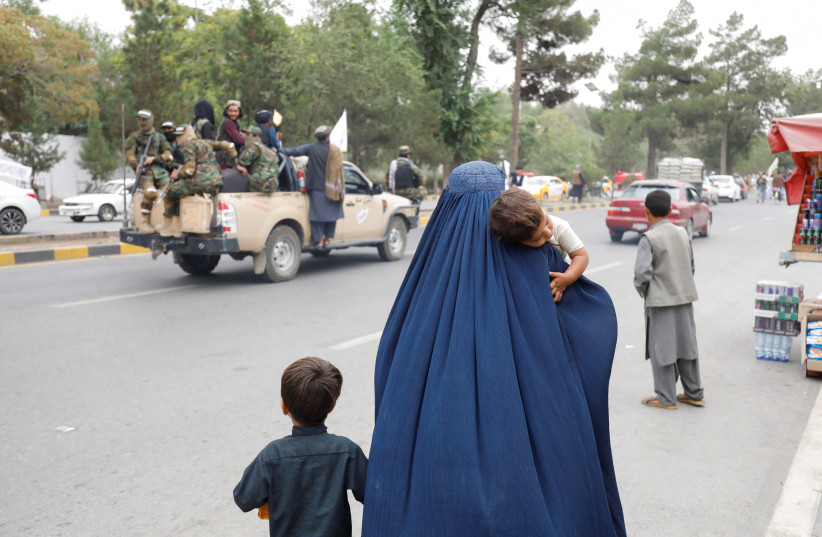Afghans residing in a refugee camp in the United Arab Emirates launched protests this week, raising concerns about their unresolved situations as they continue to wait for a permit to move to the United States a year after they fled from their home country.
For more stories from The Media Line go to themedialine.org
The refugees left Afghanistan due to the Taliban's takeover of the country after the US withdrew its troops in August 2021. The refugee camp outside of Abu Dhabi hosts about 12,000 Afghans who say they were promised a US visa and that the UAE camp would be a temporary way station for them to wait for entry permits before traveling to the United States.
Since the fall of the government of Afghanistan a year ago, millions of Afghans have been desperate to leave the country for security, economic and political reasons, causing one of the world's greatest refugee crises.
Ajmal Shams, former Deputy Minister of Urban Development for the Islamic Republic of Afghanistan that fell in 2021, told The Media Line that not everyone has the same reason to leave the country.
"Some have a genuine threat to their lives due to their association with either the former government or a foreign mission in Afghanistan, others are afraid due to their political opinions, and still there are many who do not see any future for themselves in the country," he said.

R. Qazi, a resident of the refugee camp outside of Abu Dhabi, told The Media Line that the situation of the refugees in the camp is very difficult since the process of getting US visas is very slow, which led to the protests.
"The refugees cannot bear with long waiting anymore and it is frustrating. There is no healthy education and learning programs and no decent food either," she said.
Life in the refugee camp
She described day-to-day life and the living conditions in the camp.
"I have some friends here that we spend time together for some time daily, learn languages and sometimes read. We are not allowed to work at all, or go out of the camp until it is an emergency illness to go to the big hospital in the city. But even some diseases like teeth problems and skin problems are not taken care of and there is no proper and responsible health care service as well," she said.
Qazi explained that the evacuees from the Afghan capital Kabul are divided into two categories, those who have active cases and whose process for getting a permit while in the UAE is very slow, and those who do not have active cases, and no path to any country, which puts them in an unclear situation.
Shams says that those who are eligible and have the required documentation are being resettled in the US. "Obviously, the process takes time and requires patience," he added.
In general, continued Shams, "the US has been highly generous in providing protection to those who are highly vulnerable. It is understood that taking asylum under various programs requires eligibility and documentation."
Naeem Poyesh, Afghanistan’s former deputy ambassador in Brussels to the European Union and NATO and former acting ambassador in Vienna to the United Nations and other international organizations, told The Media Line that there is not enough political will in the Biden Administration to bring more Afghans into the United States.
Poyesh, who has been living in the United States since August 2021, added that many of these Afghans have applied for humanitarian parole visas, which take a long time to get processed by US Citizenship and Immigration Services (USCIS), an agency of the US Department of Homeland Security that administers the country's naturalization and immigration system.
"Only a few have been accepted from tens of thousands of applications, indicating a lack of genuine willingness at the USCIS to act," he said.
However, Neil Weinrib, an immigration lawyer and founder and president of Neil A. Weinrib & Associates immigration law firm in New York, says that, in fact, the agency’s delay in granting visas is an effect of former President Donald Trump's administration.
Trump curtailed the refugee program in the US a number of years ago as part of his administration’s policy to reduce immigration into the United States, Weinrib explained.
"They cut the budget and the administration personnel. The program that Biden inherited was not equipped to deal with the Afghan situation," he said.
Ukraine also has been an important factor, according to Poyesh, since it is attracting more attention and sympathy in the West and sidelining the Afghan issue altogether.
Future remains unclear for Afghan refugees
Concerning the Afghan refugees with frozen status in the UAE, he believes that the US “has to make a decisive decision about these refugees. Keeping them in a camp is inhumane."
Qazi says that the answer the US has given to the refugees on the issue is that those with cases for Special Immigrant Visas, Priority 1 Visas, and Priority 2 Visas will be processed, and those who do not have active cases will not be moved to the US and they can apply for a visa to a different country.
"Up to now, no solution is suggested, and no decision is made regarding them. Some are referred to the Canadian embassy that is also not transparent," she said.
Poyesh noted that, most probably, the refugees that are not eligible to get a permit for the US, will be distributed to third countries such as Canada, European countries or Latin America.
Qazi stressed that returning to Afghanistan is not an option for them. "No one here can return to Afghanistan because they are at risk there. And from the authorities also, refugees are not given an option to return."
